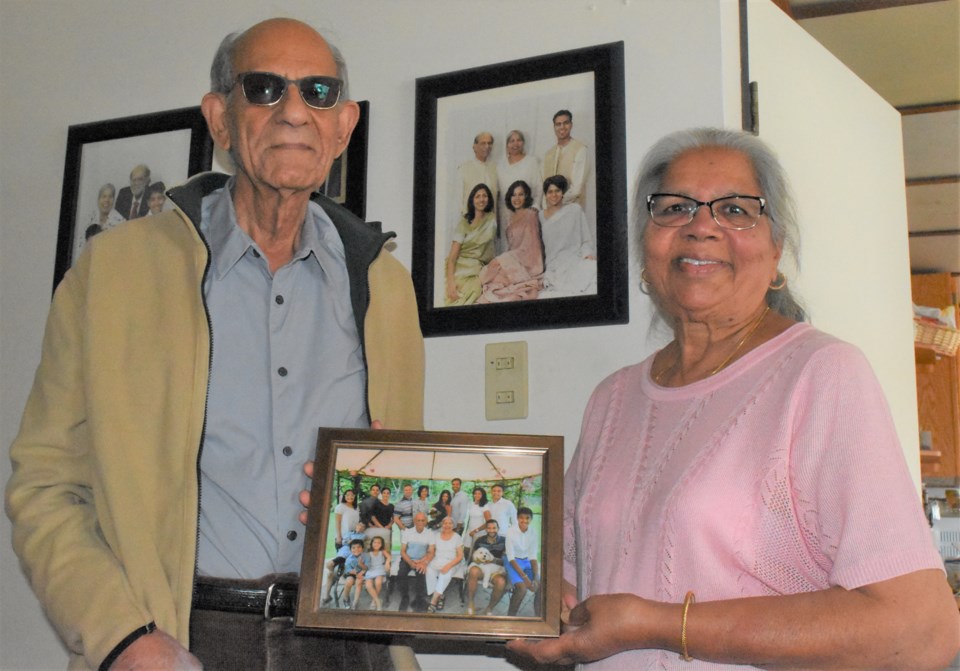Long-time volunteer Usha Sharma has seen many changes during her 50 years of living in Moose Jaw, including changes to how immigrants have been received and supported.
Sharma, 77, is well-known for her work in the community, particularly at the Newcomer Welcome Centre, the Moose Jaw Multicultural Centre, Saskatchewan Polytechnic, Riverside Mission and at St. Aidan Anglican Church’s Sunday lunches.
She has also taught language classes in both school divisions, worked with church groups to help them better understand Hinduism, and provides translation services for the Moose Jaw Police Service since she speaks four languages.
“In our culture, for volunteering, you earn your destiny. For the exchange of money, you earn your living,” she said. “So everybody should do volunteer work.”
To celebrate her work with the immigrant community, the Indian-born volunteer is holding come-and-go meals at her home on Tuesday, Oct. 1, from 9 to 11:30 a.m., from 1 to 3:30 p.m., and in the evening. Anyone interested in attending is encouraged to RSVP by calling 306-692-8456.
Coming to Canada
Sharma left India in 1966 at age 24 and moved to England to be with her husband, Hari. They moved to Toronto in December 1968, before moving to Saskatoon. The couple finally settled in Moose Jaw in October 1969, after Hari found a job at Valley View Centre. Three of their four children were later born here.
She began working at the centre in 1972 and over the next few decades, worked in nearly every department. She worked mostly evenings and weekends while her husband worked days.
Sharma believes volunteering is important. This is why she has helped at the multicultural centre since it formed in 1974. She has used her experiences in Moose Jaw to help new immigrants understand how life works here. She also volunteered with a group called the Immigrant Women of Saskatchewan — Moose Jaw chapter, which formed in 1983. It later changed its name to the International Women’s Society.
One aspect of Canadian life Sharma noticed early on was Canadians didn’t invite immigrants into their homes that often.
Not having any family in Moose Jaw made it a lonely experience for her for 10 years, but she took ceramic classes to meet and socialize with others. However, she chuckled, she didn’t talk with the young women in the class — Sharma was 27 at the time — since they talked about the boyfriends and going to bars.
“I was a mother and my kids were my priority,” she said. “I worked around the kids.”
Changing cultural traditions
It also took Sharma 10 years to retrain habits she had developed living elsewhere, she explained. For example, she dressed up in cultural clothing in India. However, that changed when she moved to Canada. Her Ukrainian neighbours told her they too had dressed up culturally when they arrived, but changed clothing styles once they settled in the community. So, Sharma started wearing pants instead of dresses.
With a laugh, Sharma said there was a dress code at Valley View where nurses’ aids had to wear dresses. She wore those dresses — with pants underneath.
“Moose Jaw is important (to me) because … I have never lived anywhere that long (for 50 years). I love it,” Sharma said.
The community is small, which she appreciates. Her children — who moved away — attempted to move her and Hari to another city, but were unsuccessful. Sharma pointed out she never left because she became friends with her kids’ friends’ parents, developed friendships through work, and created solid contacts while volunteering.
Sharma has seen Moose Jaw evolve during her five decades living here and named some changes she noticed over the years. This includes: no Ninth Avenue Southwest bridge, a fire hall used to be downtown, and Safeway used to be where Western Nissan is now. She added that Yara is actually a Hindu word meaning friendship.
Challenges to new immigrants
New immigrants face challenges when they come today, Sharma said. Speaking English is difficult, while they aren’t able to celebrate their cultural festivals in the same way. Such festivals are celebrated on a larger scale in big cities such as Regina or Saskatoon.
Having lived on three continents, Sharma has seen similar problems everywhere but in different amounts. For example, she noted divorce rates are higher in North America, while poverty used to be higher in India but is now similar in Canada. However, she noticed that army personnel are more accepting of immigrants since they have travelled the world as part of their deployments.
Sharma believes the government should support immigrants in the short-term, but neighbours and society should provide assistance in the long-term.
“Because someone helped me, I should help others. In the Boy Scouts, you should do one good thing every day,” she added. “Once change starts here (in the mind), then the whole world … is the family.”




